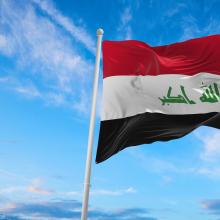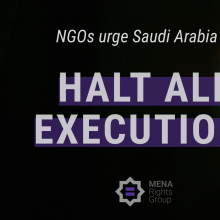March 01, 2023

Abu Dhabi skyline after the rain has cleared © Imran Shahabuddin, licensed under CC BY 2.0
On February 20, 2023, the United Nations Working Group on Enforced or Involuntary Disappearances (WGEID) published a general allegation on the pattern of enforced disappearances in the United Arab Emirates (UAE). Prompted by a submission by MENA Rights Group (MRG), the WGEID sent the allegation letter, containing 12 questions, to the UAE authorities after its 128th session in September 2022. The UAE was given 60 days to respond to the letter but has not provided any comment to date.
In its allegation, the WGEID highlighted several impediments to the implementation of the 1992 Declaration on the Protection of all Persons from Enforced Disappearances in the country. These include the Emirati authorities’ pattern of conducting arrests leading to enforced disappearances, their failure to codify enforced disappearance as an autonomous crime, and their violation of the principle of non-refoulement in cases where persons are in danger of enforced disappearance.
Enforced disappearances: a tool of silencing dissenting voices
In view of the general rise in the number of enforced disappearances registered in the UAE in the last decade, the WGEID echoed MENA Rights Group’s concerns over the UAE’s pattern of targeting human rights defenders, journalists, lawyers, and members of religious minorities. The Working Group asked the UAE government to account for the preventative measures put in place to safeguard their rights to freedom of expression, freedom of assembly, freedom of association and freedom of religion without being subjected to enforced disappearance.
Flawed legal framework
The WGEID asked the UAE to provide clarification on the compliance with international standards of the Law on Combating Terrorism, referring to its “overly vague definition of terrorist offences”. In addition, the WGEID requested authorities to clarify how persons deprived of their liberty were afforded legal safeguards.
Furthermore, although the UAE’s current criminal legislation codifies the offences of kidnapping, arresting, detaining and illegally depriving a person of their freedom in any way, it does not include enforced disappearance as a separately defined offence. The Working Group therefore asked the Emirati authorities to clarify which offences are used in criminal investigations concerning reports of disappeared persons, in such absence of a separate crime of enforced disappearance, as well as enquired about future of legislative reform to address this shortcoming.
Failure to safeguard the rights of persons deprived of their liberty
In its submission, MENA Rights Group stated that the Emirati authorities commonly restrict information on their detainees and deny their arrest and subsequent deprivation of liberty. As a result, the Working Group inquired as to whether the UAE maintains official registers of all persons deprived of their liberty in every place of detention, and if they are accessible to their relatives, their counsel or any other person having legitimate interest.
The Working Group also echoed MENA Rights Group’s concerns over persons deprived of their liberty being denied access to legal counsel or consular protection in the case of foreigners, and requested the UAE to provide information on the measures undertaken to guarantee their communication with the aforementioned in accordance with international law.
The role of the State Security Apparatus
As the State Security Apparatus (SSA) holds a significant role in the perpetration of enforced disappearances in the UAE, the WGEID requested the UAE to provide information on the SSA’s supervision mechanism and its operations’ compliance with international law.
The letter of allegation recalled the SSA’s alleged pattern of carrying out arrests in individuals’ homes, in civilian clothing, and without arrest warrants. The WGEID thus requested the UAE to provide information on the applicable legislation concerning arrest warrants.
The Working Group further addressed the SSA’s alleged systematic use of prolonged administrative detention and asked how the Emirati authorities guarantee the detainees’ right to challenge the legality of their detention. Additionally, regarding the SSA’s practice of holding individuals incommunicado, the WGEID requested information on the measures adopted to prevent secret detentions.
Involvement in the context of the Yemeni armed conflict
Recalling the hundreds of cases communicated to them of enforced disappearance attributable to UAE security forces in Yemen, the WGEID asked the government to provide information on their involvement in the detention of individuals in this context.
The letter specified cases of individuals allegedly linked to the Houthi armed group being deprived of their liberty and subjected to enforced disappearance in UAE-controlled detention facilities in Yemen. Consequently, the Working Group requested the UAE to clarify whether they are involved in such detentions, and to account for the guarantees offered to ensure that no one is held in secret detention in sites controlled by Emirati forces.
Violation of the principle of non-refoulement
The letter of allegation addressed the Emirati authorities’ reported failure in adopting adequate measures to ensure that persons, notably Pakistani Shi’a Muslims, are not expelled, returned or extradited to other States where there are substantial grounds to believe that they would be in danger of enforced disappearance. Therefore, the WGEID asked the UAE to provide information on the measures undertaken to ensure the respect of the principle of non-refoulement.
No effective remedies and fear from reprisals
In the UAE, no investigations are undertaken on cases of enforced disappearances, unless a formal complaint has been filed. In view of this matter, the WGEID asked the UAE how they ensure prompt, thorough and impartial investigations for enforced disappearances even without a formal complaint. Furthermore, the Working Group asked how the Emirati authorities guarantee the right to a prompt and effective judicial remedy as a means of determining the whereabouts of persons deprived of their liberty. As persons willing to lodge a complaint allegedly face a number of legal and practical obstacles, the Working Group inquired about how the UAE allows for complaints to be lodged before a competent and independent authority.
In their letter, the WGEID also echoed MENA Rights Group’s concerns over reprisals, threats and harassment faced by relatives of disappeared persons lodging complaints and seeking remedies. They asked the UAE what measures they have taken to ensure the protection of all those involved in the investigation of an enforced disappearance. In particular, the Working Group inquired if any investigation into alleged reprisals against relatives of disappeared persons and their representative organisations are being carried out.
In light of the issues raised in the general allegation, we call on the Emirati authorities to take a number of steps to combat and prevent the crime of enforced disappearance, including: ratifying the convention for the Protection of All Persons from Enforced Disappearance (ICPPED), implement a judicial oversight mechanism over the SSA’s operations, taking effective steps to ensure that persons who are arrested have the benefit of all fundamental legal safeguards from the very outset of their detention, and ensuring that counter-terrorism laws and laws related to State security comply fully with international human rights standards.






